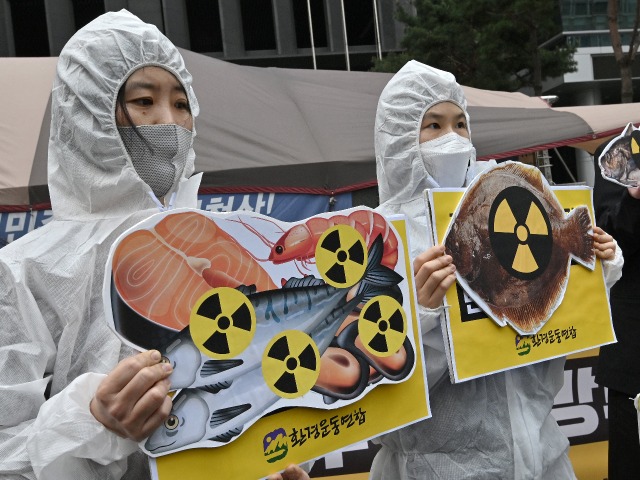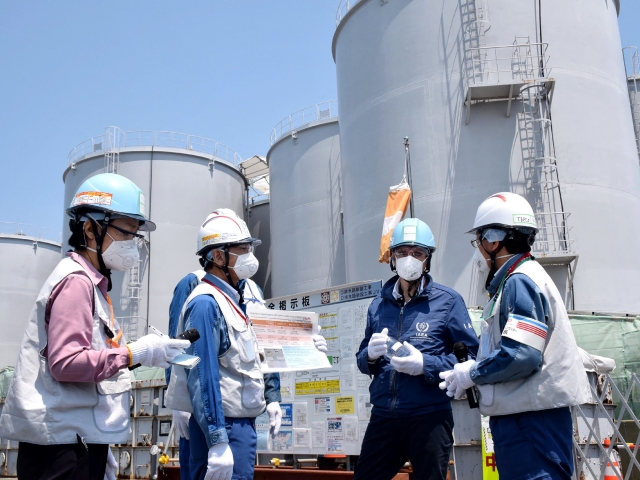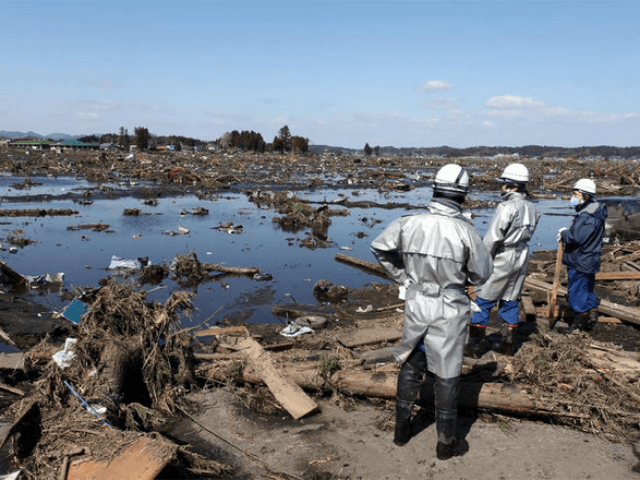The Japanese Foreign Ministry and Prime Minister Kishida Fumio urged the Communist Party of China to protect Japanese citizens in the country from a wave of abuse against them as a result of Tokyo approving a plan to dump wastewater into the ocean from the damaged Fukushima Daiichi Nuclear Plant.
The Fukushima plant was rendered inoperable in 2011 when a magnitude 9.0 earthquake and subsequent tsunami destroyed the site. Three of the Daiichi Plant’s reactors melted down, forcing the mass evacuation of residents in the prefecture and alarming the entire region. To prevent further disaster, operators have been using cooling water to keep the plant from suffering a full collapse, but the process has resulted in massive amounts of radioactive wastewater.
After being treated, the wastewater, Japanese officials claim, is largely harmless with the exception of the presence of tritium, a radioactive isotope of hydrogen. To release the wastewater and continue operations for decommissioning the plant, operators have greatly diluted the water and have a plan to release it into the ocean over a span of 30 years. The water release began this week, prompting a nationwide anti-Japanese campaign in China.
The International Atomic Energy Agency (IAEA), the United Nations’ nuclear oversight agency, approved the plan, as the amount of tritium in the wastewater is six times lower than the upper limit the World Health Organization (W.H.O.) recommends for safe drinking water.

File/South Korean environmental activists during a protest against Japan’s decision on releasing Fukushima wastewater, near the Japanese embassy in Seoul on April 13, 2021. (JUNG YEON-JE/AFP via Getty Images)
“In theory, you could drink this water,” James Smith, a professor at Portsmouth University, told the BBC this weekend.
China – as well as neighboring South Korea – has a long history of dumping wastewater from its nuclear power plants into the sea without incident. The Communist Party, through its media outlets, has claimed that their radioactive water dumps are different from the Fukushima situation because that wastewater comes from plants operating normally, rather than one destroyed by a tsunami.
Japanese authorities have documented a surge in abusive phone calls to its government agencies from Chinese telephone numbers, as well as multiple incidents of abusive behavior in China. According to the Japanese news network NHK, an unknown attacker threw a stone into a Japanese school in China’s Shandong Province, an apparent threat to its students, and a school in Jiangsu Province suffered an egg attack.
NHK documented a barrage of posts on Chinese social media networks – which the Communist Party heavily regulates and censors – sharing the phone numbers of Japanese government agencies and other locations demanding Chinese nationals protest the Fukushima water plan. “Patriotic” Chinese propagandists have produced harrowing images of monsters emerging from Japanese waters.
Social media videos from China show schoolteachers terrorizing children. In one video translated by anti-communist journalist Jennifer Zeng, a primary school teacher assigns children to write letters to Kishida protesting the wastewater. The teacher tells the students that Japanese people “want to control other people’s shit and farts” and are “beasts” and “inhuman.”
The teacher also warns that the wastewater would turn the children’s descendants into “mermaids.”
Videos from Chinese supermarkets show citizens fighting over bags of salt, attempting to hoard out of fear that the Fukushima water would eliminate the region’s sea salt supply indefinitely.
Tokyo Electric Power Company Holdings Inc. (TEPCO), the company that maintains the Fukushima nuclear plant site and is orchestrating the water dump, claimed to have received over 6,000 phone calls from China in four days about the topic, presumably overwhelmingly against the plan. Random police offices in Fukushima prefecture have also complained of a large volume of angry phone calls from China about the situation.
“We strongly urge the Chinese government to take all possible measures to ensure the safety of Japanese residents and our diplomatic missions in the country, and to provide accurate information about the treated water,” Japanese Chief Cabinet Secretary Matsuno Hirokazu said in a statement on Monday. “We are going to keep urging the government to do so.”
Kishida described the barrage of abuse against his country from China as “regrettable” on Monday and announced that his government would plan security measures for the nation’s threatened fishing industry, as China and both Koreas are either limiting imports or outright banning them out of fear that fish from Japan is now contaminated.
The Japanese government summoned Chinese Ambassador Wu Jianghao to lodge a protest over the abusive behavior and demanded Beijing offer “accurate information” regarding the TEPCO water release plan, rather than fuel outrage. Beijing later claimed that Wu also formally lodged a protest against the Japanese government.

Director General of the International Atomic Energy Agency (IAEA) Rafael Grossi (2nd-R) stands in front of the storage tanks for radioactive water as he visits the Tokyo Electric Power Company Holdings (TEPCO) Fukushima Daiichi nuclear power plant in Okuma, Fukushima prefecture on May 19, 2022.STR/JAPAN POOL / JIJI PRESS/AFP via Getty Images)
The Japanese Foreign Ministry has also warned Japanese citizens in China not to speak Japanese loudly in public and to avoid anti-Japanese protests on the streets, to avoid a potential assault or arrest.
Chinese Foreign Ministry spokesman Wang Wenbin claimed on Monday that he was “not aware” of any abusive or harassment calls by Chinese nationals against Japanese individuals and companies.
“I want to stress that the international community have expressed criticism extensively and taken relevant preventative measures in response to the selfish and irresponsible act of the Japanese government,” Wang said when asked about the abuse. “The attitude of criticism and opposition to the Japanese government is highly representative in the world.”
Wang nonetheless claimed that China “protects and ensures the safety and lawful rights and interests of foreign nationals in China.”
Follow Frances Martel on Facebook and Twitter.

COMMENTS
Please let us know if you're having issues with commenting.